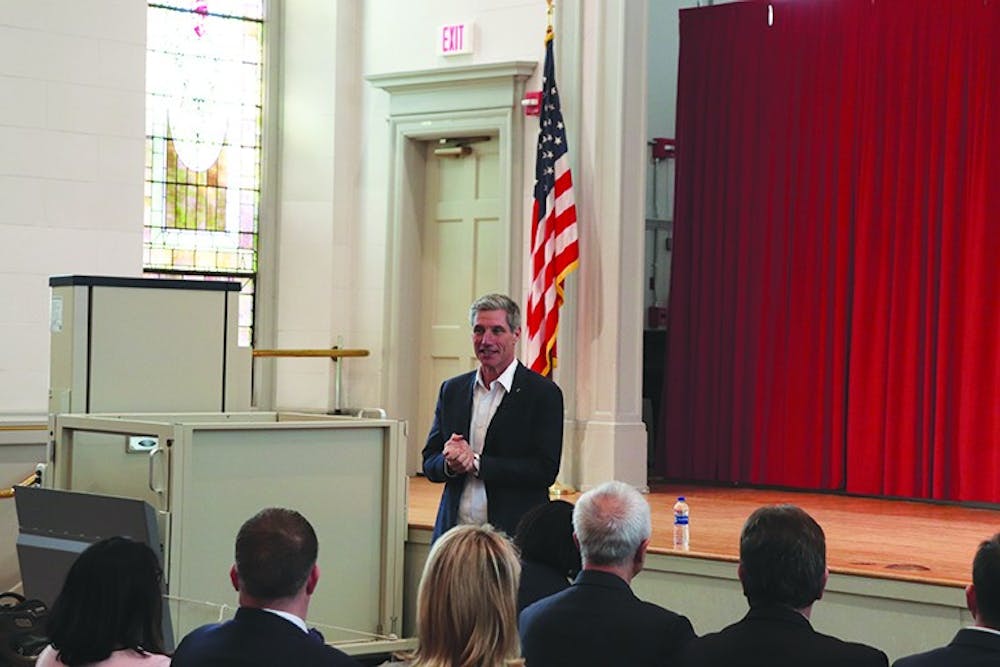Pennsylvania State System of Higher Education (PASSHE) Chancellor Daniel Greenstein addressed questions of Shippensburg University campus community members about his “directives” Thursday on the first stop of his spring university tour.
Greenstein sent faculty and staff members an email on Feb. 14 listing the “directives,” which include curtailing the use of temporary faculty, eliminating low-enrolled programs and leaving staff and faculty positions vacant.
Administrators, faculty, staff and students gathered in the Old Main Chapel to hear the chancellor.
The chancellor praised SU for improving its retention rates and said he is not worried about the university during the redesign period.
“They’re not going to be fun to make, but they have to be made,” Greenstein said in regard to the choices PASSHE universities face.
Neil Connelly, SU English professor, stated his and his colleagues’ fears with the chancellor.
“Some of us are panicked,” Connelly said. “You don’t have the perspective that we do.”
Connelly referred to the Feb. 14 directives email and the interchanging of words by various groups and leaders as to whether or not the directives were mandates or merely suggestions.
“As an English guy, I’m a word guy, and those are radically different,” Connelly said.
Greenstein explained the directives are tools for the sustainability plans to meet PASSHE’s goals.
He also emphasized how important communication is throughout the System Redesign process.
Sarah Grove, an SU political science professor, and representative to the interim faculty council, said her concerns for the five-year plan to implement changes will gut adjuncts from departments and impact programs.
She also said professors are trained for their own subjects and are not equipped to teach others.
“It is disingenuous to start advertising that we have an engineering program when you don’t have some of the heart and soul of the program, which is physics,” Grove said.
SU President Laurie Carter responded to Grove by explaining there are two different processes occurring — the sustainability plan and the work, planning and budget council. There is some overlap, however the plans are separate.
“It is in the best interest of our students to fix our deficit now so we can begin to invest in our programs,” Carter said. “We’re not gutting our programs.”
She added there will be some outcomes people do not like.
Kara Laskowski, SU Association of Pennsylvania State College and University Faculties (APSCUF) chapter president criticized Greenstein’s communication about the sustainability plans.
“We need you to be consistent with us,” Laskowski said. “We need that consistency with the message of shared governance.”
She also discussed recent news that PASSHE could consider “retrenchment” and the possibly of cutting positions if the State System does not reach 200 faculty members for its early retirement incentive by March 2. Penn Live reported that 165 faculty members agreed to take early retirement.
He also emphasized how important communication is throughout the System Redesign process.
Greenstein responded by discussing literary theory in which the reader can create a narrative from what they are reading based on their perspective and experiences.
“From my perspective, there is only consistency,” he said.
Greenstein again emphasized the importance of communication and transparency.
The chancellor answered questions for an hour before the conclusion of the event.
Greenstein met with members of the Student Government Association later in the afternoon, holding an open conversation about the System Redesign, scholarships and how classes shared across the system could work in the future.
Students were not officially invited to the event, which was held from 11 a.m.–12:15 p.m.



The Slate welcomes thoughtful discussion on all of our stories, but please keep comments civil and on-topic. Read our full guidelines here.